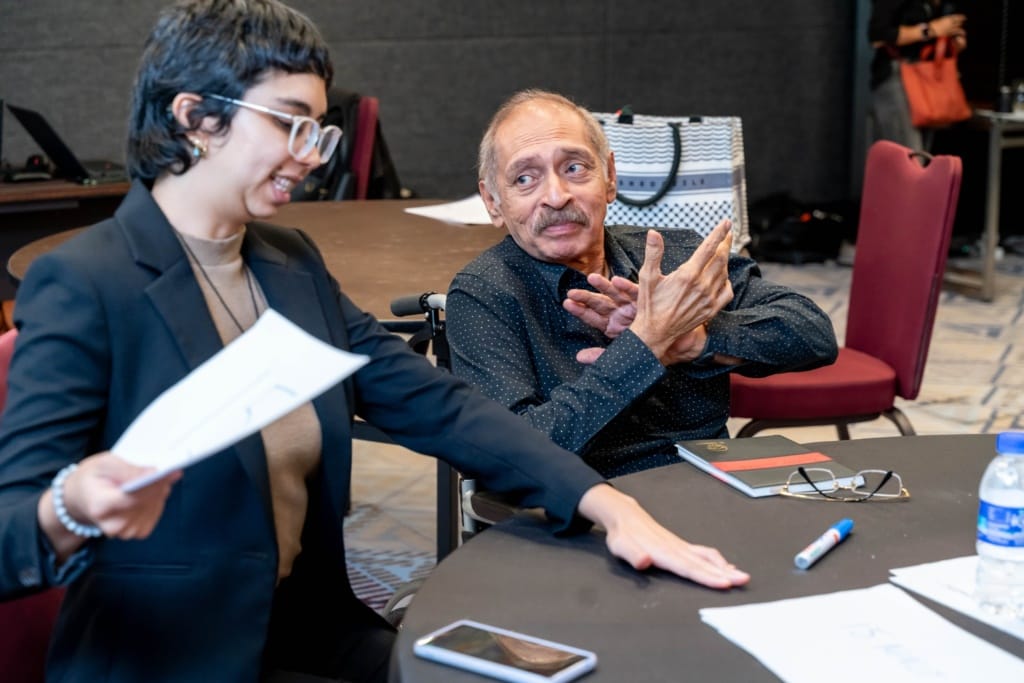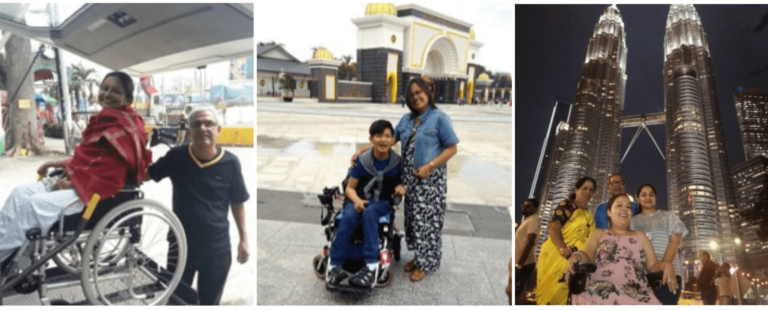We speak to Antony Leopold, President and Founder of the Asia Pacific Network on Accessible Tourism (APNAT), on leading the advocacy for Accessible Tourism.

Antony Leopold (right) talking to The Habitat Foundation’s Yohanna Yusrinal (left) during the United Nations Development Programme (UNDP) Workshop on Sustainable Tourism. Photo by: UNDP.
In a world of 8.2 billion people, around 1.2 billion live with disabilities. Eighty percent of them reside in developing nations, where infrastructural and systemic challenges often limit their ability to travel freely. In Malaysia, where the tourism industry contributes RM81 billion annually to GDP, the inclusion of travellers with disabilities could significantly expand this figure. However, the nation still grapples with barriers that prevent equitable access to travel, from limited infrastructure to inadequate facilities at tourist destinations.
Antony Leopold’s efforts through the Asia Pacific Network on Accessible Tourism (APNAT) aim to bridge the gap in accessible tourism by advocating for the development of inclusive travel infrastructure and raising awareness about the unique needs of travellers with disabilities. APNAT focuses on integrating inclusive activities and offers specialised training programmes and workshops for stakeholders and employees. It sets industry standards for best practices, promotes equality, ensuring barrier-free travel for all. Antony is also the founder of Ace Altair Travels, a tour agency that has facilitated accessible tours for over 1,000 persons with disabilities and their families. His commitment to accessible tourism is deeply personal—shaped by his own experiences as a disabled person. Like many, his passion for travelling stems from a love of adventure and a desire to learn, to interact with diverse cultures, and to build meaningful relationships.
“During my youth, I came from Ipoh, travelled to Singapore to study and Kuala Lumpur to work. I was lucky that I could travel, and seeing other disabled people travelling so smoothly inspired me.” Antony Leopold
Building the Asia Pacific Network of Accessible Tourism (APNAT)
From his experiences at international conferences and workshops, Antony was inspired to start an association dedicated to accessible tourism in the Asia-Pacific region, much like its counterpart, the European Network for Accessible Tourism. APNAT was officially established in 2007 as a collaborative platform for stakeholders to promote accessible tourism and advocate for the inclusion of persons with disabilities in the travel industry. The rationale was to foster partnerships and teach members how to implement accessible tourism effectively.
In 2019, plans were underway to expand APNAT’s presence with collaborations in Kuala Lumpur, Johor Bahru, and Penang. However, the COVID-19 pandemic disrupted these plans, forcing many private tour agencies to move away from inclusive travel. Despite the challenges, APNAT is rebuilding its operations, with a renewed focus to make “Inclusive Travel within everyone’s ability and reach”.

Conferences and workshops held with Antony Leopold. Photos by: Ace Altair Travels Sdn Bhd.
Accessible Tourism: Challenges and Opportunities
According to Antony, three significant issues hinder accessible tourism: a lack of awareness, infrastructure gaps, and insufficient education. He highlighted the persistent disregard for the rights of persons with disabilities, from illegal parking in spaces designated for them to the absence of inclusive design in new buildings. Malaysia has made efforts to introduce accessibility standards, including the MS1184 (Malaysian Standard on Accessibility in the Built Environment) and the Uniform Building By-Law (UBBL) which also includes provisions for accessible design. However, these regulations are not always enforced consistently. Hence, many new buildings, shopping malls, and hotels still fail to incorporate accessible design principles into their construction plans.
“Malaysia is lagging behind some developed countries like the U.S. and those in Europe and Australia, where there has been more comprehensive and long-term investment in accessible infrastructure. However, Malaysia’s urban centres are beginning to improve, and there’s growing awareness of the importance of accessible tourism.” Antony Leopold
Infrastructure gaps are the most prevalent obstacle in Malaysia. As accessible transportation and accommodations are often inconsistent and fragmented, persons with disabilities have limited options for seamless travel. While cities like Kuala Lumpur have begun integrating more accessible transport options (e.g., wheelchair ramps in certain buses), these features are not widespread across the country. APNAT’s efforts to raise awareness on accessibility aim to establish a universal standard for inclusivity, extending beyond tourist-centric cities to encompass the entire country. By standardising accessibility nationwide, local persons with disabilities could see an improvement in their quality of life, while also paving the way for international tourists to explore Malaysia’s lesser-known destinations and hidden gems. It carries the potential to boost local tourism by enabling people with disabilities to explore and enjoy the country’s rich cultural and natural heritage.
Antony notes that the lack of education and trained personnel pose a significant challenge to accessible tourism. Basic tasks, such as directing travellers with disabilities to designated parking spaces are often mishandled due to insufficient training. Initiatives like APNAT’s training programmes address these issues by equipping those working in tourism with the skills and awareness needed to support the disabled community. These initiatives could transform accessible tourism into a thriving sector that not only drives economic growth but also fosters a more inclusive society.
Accessible tourism presents vast opportunities, both economically and socially, for Malaysia and beyond. The growing global demand for inclusive travel highlights the untapped potential for developing similar systems locally. Despite increasing requests for accessible tours, Antony notes that the supply of inclusive travel providers is unable to meet this demand.

Families that have travelled tours under Ace Altair Travels Sdn Bhd. Photo by: Ace Altair Travels Sdn Bhd.
Vision for the future
To create a world that is truly inclusive, we must harness the collective wisdom and talents of everyone—abled and disabled, young and old. Raising awareness and championing inclusivity require united efforts to break down barriers and build a society where everyone can thrive. By working together, we can shape a future that ensures equality, dignity, and accessibility for all.
“Championing accessibility in tourism is not just a career path; it’s a mission to make the world more inclusive for everyone. By educating yourself and advocating for change, you can create meaningful change. The work you do has the potential to transform travel experiences for millions of people with disabilities, and as the demand for accessible travel continues to rise, you’ll be a critical movement for equality and inclusion.” Antony Leopold
Find out more about APNAT and their work here.
Writer: Zen Faeq (The Habitat Foundation)
Contributor: Antony Leopold (APNAT)

